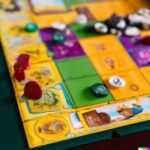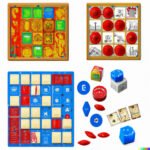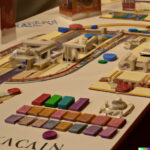Are you a fan of classic edition board games? From Monopoly to Scrabble, these timeless games have been capturing the hearts of both young and old for generations. In this article, we will delve into the nostalgia and enduring popularity of classic board games, tracing their origins, highlighting their impact on popular culture, and exploring their continued relevance in our digital age.
Classic edition board games have a rich history that dates back decades. They have stood the test of time and continue to be beloved by millions around the world. In this section, we will take a closer look at what makes these games so special and why they hold a special place in our hearts.
We will also explore the modern twists on classic edition board games – from reimagined versions to special editions designed for a new generation. Additionally, we will discuss the growing trend of collecting classic board games and share tips and ideas for hosting a fun and memorable game night with friends and family. Get ready to embark on a journey through the world of classic edition board games.
The History of Classic Edition Board Games
Origins of Monopoly
Monopoly, one of the most popular board games of all time, was originally created in the early 20th century. The game’s origins can be traced back to an American woman named Elizabeth Magie, who patented a game called “The Landlord’s Game” in 1904 as a way to illustrate the economic concept of land value taxation. Over the years, Monopoly has evolved and been adapted into numerous editions featuring different themes and versions.
The Invention of Scrabble
Scrabble, another classic board game favorite, was invented by Alfred Butts during the Great Depression in 1938. Originally called “Lexiko” and later “Criss-Cross Words,” the game eventually became known as Scrabble in the late 1940s. Its enduring appeal lies in its simple yet engaging wordplay that challenges players’ vocabulary and strategic thinking.
Creation of Clue
Clue, originally known as Cluedo in the United Kingdom, was designed by Anthony E. Pratt in 1944 as a murder-mystery solving game. The game’s premise revolves around players assuming the roles of characters trying to solve a murder mystery by deducing the murderer, location, and weapon used. With its intriguing storyline and deductive reasoning gameplay, Clue has become a timeless classic among board game enthusiasts.
The Enduring Popularity of Classic Board Games
Additionally, classic board games offer a timeless form of entertainment that fosters social interaction. In today’s digital age, where so much entertainment is solitary and screen-based, the appeal of gathering around a table to play a game with loved ones holds a special allure. Classic board games encourage face-to-face interaction, communication, and friendly competition, strengthening bonds between players.
Furthermore, the versatility of classic board games adds to their enduring popularity. These games can be played in various settings such as family gatherings, parties, or quiet evenings at home. Some classic board games have also been adapted into travel-sized versions, making them convenient for on-the-go entertainment. The adaptability and portability of these games contribute to their continued relevance in today’s fast-paced world.
| Factor | Impact |
|---|---|
| Nostalgic factor | Creates warmth and familiarity across generations |
| Accessibility | Suitable for players of all ages and skill levels |
| Versatility | Can be played in various settings and adapted into travel-sized versions |
Iconic Board Games
The world of classic edition board games is filled with iconic titles that have left an indelible mark on popular culture. These games have not only stood the test of time, but they have also become a beloved part of many people’s lives, transcending generations and capturing the hearts of players young and old.
Monopoly
One of the most iconic board games of all time, Monopoly has been a staple in households around the world since its creation in 1935. The game, which sees players buying, renting, and trading properties to amass wealth, has evolved over the years with countless special editions based on popular franchises like Star Wars and Game of Thrones.
Its timeless appeal lies in the competitive nature of accumulating properties and bankrupting opponents, making it a classic game for family gatherings and friendly competitions.
Scrabble
Scrabble, first introduced in 1938, is another classic board game that has had a profound impact on popular culture. The game challenges players to create words using letter tiles with varying point values, sparking creativity and linguistic skills. With its simple yet engaging gameplay, Scrabble has become a staple at gatherings and has even inspired national and international tournaments. Its enduring popularity is a testament to its ability to bring people together through language and friendly competition.
Clue
Released in 1949, Clue is a murder mystery-themed game that has become a timeless favorite among fans of deduction and strategy. Players must gather clues to determine the culprit, weapon, and location of a crime, leading to intense rounds of speculation and investigation. The game’s intricate storytelling and engaging gameplay have solidified its status as an iconic board game that continues to captivate players.
These iconic board games have left an undeniable mark on popular culture, shaping social interactions and bringing joy to countless individuals across the globe. Their enduring appeal highlights the significance of classic edition board games in providing entertainment that transcends time and technological advancements.
Modern Twists on Classic Edition Board Games
The enduring popularity of classic board games has led to a resurgence of interest in these timeless favorites, prompting game manufacturers to create modern twists on traditional titles. From reimagined versions with updated graphics and gameplay to special editions featuring popular themes, classic edition board games are being adapted to cater to a new generation of players while keeping the essence of the original games intact.
One example of a reimagined classic board game is the modern version of Monopoly, which not only features updated property values and game tokens but also incorporates digital elements such as electronic banking. This innovative twist on the beloved game adds a new level of interactivity for players while preserving the familiar mechanics that have made Monopoly a staple in households for decades.
Additionally, special edition versions of classic board games have become increasingly popular, offering unique themes and designs that appeal to different interests. For instance, there are special editions of Scrabble featuring pop culture references and themed word tiles, as well as Clue editions based on popular TV shows and movies. These variations provide a fresh take on the original games while introducing new elements that engage contemporary audiences.
Overall, the evolution of classic edition board games into modern twists and special editions demonstrates their adaptability and continued relevance in today’s gaming landscape. By combining nostalgia with innovation, these reimagined versions ensure that classic board games will remain cherished pastimes for generations to come.
| Classic Board Game | Modern Twist/Special Edition |
|---|---|
| Monopoly | Electronic banking version with updated graphics |
| Scrabble | Special editions featuring pop culture references and themed word tiles |
| Clue | Variations based on popular TV shows and movies |
Collecting Classic Edition Board Games
Classic edition board games have a special place in the hearts of many, not only for their entertainment value but also for their nostalgic appeal. As a result, there has been a growing trend of enthusiasts and collectors who seek to acquire and preserve these timeless games. Whether it’s the vintage packaging, unique game pieces, or rare editions, classic board games hold significant sentimental value for many individuals.
For those interested in starting or expanding their collection of classic edition board games, there are several avenues to explore. Here are some ways to get started:
- Thrift stores and flea markets: These places often have hidden gems waiting to be discovered. It’s not uncommon to find well-preserved classic board games at affordable prices.
- Online marketplaces and auctions: Websites such as eBay and Etsy offer a wide selection of classic edition board games, including rare and limited editions. Auctions can also be a great way to acquire sought-after games.
- Specialty shops and conventions: Some brick-and-mortar stores specialize in selling vintage toys and games, including classic board games. Additionally, attending board game conventions can provide opportunities to buy, sell, or trade with other collectors.
As the demand for classic board games continues to grow, the community of enthusiasts and collectors is thriving. There are online forums and social media groups dedicated to discussions about vintage games, trading tips on where to find rare editions, and sharing personal collections. This sense of camaraderie adds another layer of enjoyment for those who appreciate the timeless charm of classic edition board games.
How to Host a Classic Board Game Night
Hosting a classic board game night can be a fun and memorable way to spend time with friends and family. Whether you’re a seasoned board game enthusiast or just looking for something different to do, here are some tips and ideas to help you organize a successful game night:
- Choose the Right Games: When planning a classic board game night, it’s important to select games that are well-loved and easy to understand. Consider games like Monopoly, Scrabble, Clue, or The Game of Life for a mix of strategy, wordplay, mystery, and life simulation.
- Create a Welcoming Atmosphere: Set the mood for your game night by creating a welcoming and comfortable space for your guests. Arrange seating areas and tables for gameplay, set out snacks and drinks, and consider adding some background music to enhance the ambiance.
- Plan Game Night Activities: In addition to playing board games, consider incorporating other activities into your game night. You could have a themed costume contest related to the games being played or include trivia questions about classic board games as an intermission activity.
Remember that the most important thing is to have fun and enjoy spending time with your loved ones. By following these tips and getting creative with your planning, you can host a classic board game night that will be fondly remembered by all who attend.
The Future of Classic Edition Board Games
In the age of technology and digital entertainment, classic edition board games have managed to carve out a special place in our hearts and homes. Despite the proliferation of video games and online gaming platforms, these timeless games continue to thrive, connecting people across generations and providing a much-needed break from screens. As we move forward, it is likely that classic edition board games will not only remain relevant but also evolve to adapt to modern preferences and lifestyles.
One can predict that classic edition board games will continue to be cherished for their ability to foster face-to-face interaction and social bonding. In an increasingly fast-paced and digitally-driven world, the simple pleasure of gathering around a table for a game of Monopoly or Scrabble holds immense value. This human connection is something that cannot be replicated by virtual gaming experiences, making classic board games irreplaceable in the fabric of family and social dynamics.
Furthermore, as evidenced by the release of reimagined versions and special editions, classic edition board games are constantly finding new ways to stay fresh and appealing to current audiences. By embracing modern twists such as themed versions or updated gameplay mechanics, these games are able to attract a new generation of players while still retaining their nostalgic charm.
In this way, it is clear that classic board games have successfully adapted to the changing times while remaining true to their core appeal-a testament to their enduring relevance in the face of technological advancements.
Frequently Asked Questions
What Is the Main Classic Board Game?
The main classic board game is generally considered to be chess. Originating in India around the 6th century, this two-player strategy game has been enjoyed for centuries and is known for its complexity and depth of tactics.
What Is the Most Popular Traditional Board Game?
The most popular traditional board game is likely to be Monopoly. Originally published in 1935, this game of property trading and strategic decision-making has remained a favorite among families and friends worldwide, with numerous editions and variations released over the years.
What Is the Oldest Board Game That Still Exists?
The oldest board game that still exists is believed to be Senet, which dates back to ancient Egypt as far as 3500 BCE. This game was often included in burials, indicating its significance and widespread popularity in ancient Egyptian society. Today, Senet is recognized as one of the earliest known board games.

I love playing all kinds of games – from classics like Monopoly to modern favourites like Ticket to Ride.
I created this blog as a way to share my love of board games with others, and provide information on the latest releases and news in the industry.





